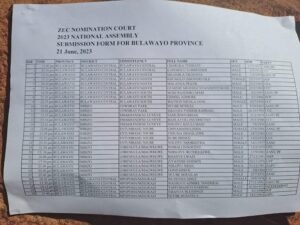- Court accepted Annexure B as showing submission times
- Submission time for Modi appears as 16:20pm on the form
- The form only has the date of the nomination court sitting and not date of submission
- Modi could be disqualified as a candidate if someone took the case to court and if the judge found the same merits to the case
- If he is disqualified, he will get another chance at the National Assembly seat as there would be no candidate left for Bulawayo South which would call for a by election
Following the High Court in Bulawayo ruling that the 12 Citizens Coalition for Change candidates and 5 others be removed from those who successfully filed their nomination papers, there have been many engagements and debates on the implications of this ruling on other candidates.
David Coltart, CCC member and candidate for Ward 4 in Bulawayo, tweeted that: ‘I see that Mr Modi Zanu PF candidate for Bulawayo South also only had his papers finalized by @zec at 16.20. Given the farcical judgment in the High Court his nomination should be nullified too’.
This article seeks to lay out the High Court’s ruling.
Background
There are media reports stating that Zanu PF candidates had all pre-filed. ZEC had announced that all candidates who so wished could lodge their papers within 10 days leading to the Nomination Court. This would mean that the nomination papers for Zanu PF were with ZEC even before the nomination court sat on 21 June 2023.
However, according to a nomination submission list from ZEC, deputy minister Raj Modi does, indeed, have his submission time stated as 16:20pm (sic).

Does this then mean that, like the 12, Modi’s nomination is reversed?
No, it is a bit more complex than this.
The Judgement
In the case Tatenda Madzinashe and others versus Innocent Ncube N.O and Others, Justice Ndlovu ruled that 1st Respondent (ZEC) is prohibited from including the names of the 15 candidates , including the CCC 12, in the preparation of ballot papers to be used in the general elections scheduled to be conducted on 23 August 2023.
In that ruling he said, ‘The 1st Respondent stated in his affidavit that he only interacted with the individual Respondents when they submitted their nomination papers. Annexure B shows when each Respondent submitted his or her nomination papers. Annexure B is a document compiled by public officials during the course of their duty in service of the State. Long after 4 pm the majority of the Respondents filed their nomination papers. The 1st Respondent and his staffers have said the times indicated in Annexure B are not what they purport to be. I find this explanation to be strange and improbable to the extent of being false. Annexure B speaks for itself. It does not need to be explained away by anyone including the 1st Respondent and his staffers. In all probability, the 1st Respondent comes up with this explanation upon realizing that this application has put him and ZEC on trial.
‘We now know that a Police Officer collected the nomination papers from the candidates. The Applicants’ case is that the 1st Respondent violated the law. I have also been moved by both sides of the bar, to give Section 46 (7) and (8) of the Act the golden rule of interpretation.
‘The Nomination Court closed at 4 pm. Once it closed it was no longer sitting in open court and by the time the respondents sat before him they were not doing so in open Court. The separation of the papers from the Respondents through the medium of the Police Officer was unlawful. The statute says the candidate or his/her agent must be in court and ready to submit at 4 pm. It does not say that the candidate’s papers alone must be in the courtroom.
‘The 1st Respondent, therefore, violated the provisions of the electoral Act in that regard as he also did close to midnight when he adjourned to 22 June 2022.’

Conclusion
From the ruling, it is clear that the Court found ZEC’s decision to use a police officer to bring in candidates’ nomination papers into the court unlawful. He also ruled that the times that are indicated on Annexure B are the times of submission. However, this did not apply to Zvikwete Innocent Mbano, where the Judge was satisfied with his account that he had submitted before 4pm and only went out to correct an anomaly.
Looking at the ruling, it is possible that Raj Modi could also be barred from the election if Annexure B is taken as the time of submission. However, this is not a given since there is a different ruling for Zvikwete Innocent Mbano.
Modi could be disqualified if someone took the case to court and if the judge, after hearing the merits, came to the same conclusion as in this case. However, after the withdrawal of the third Bulawayo South candidate, Admore Gomba – Bulawayo South would then need a separate by election.
Fact checked by FACT CheckZW ( www.factcheckzw.org )
